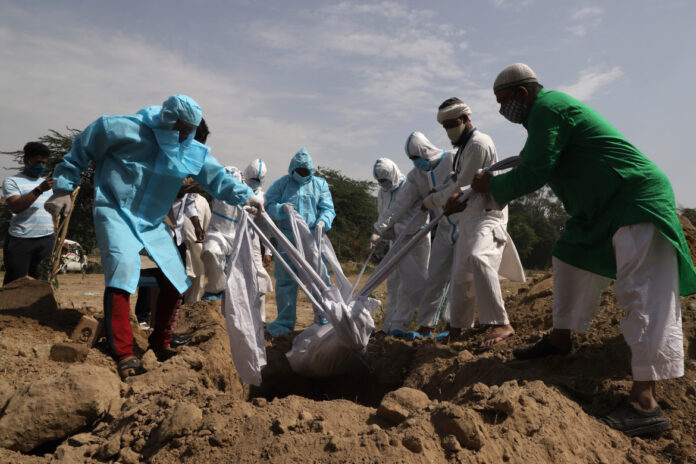
India reports 1,761 COVID-19 deaths in the past 24 hours – the highest daily toll since the pandemic erupted.
![Relatives and health workers bury the body of a man who died of COVID-19 in New Delhi [Bhat Burhan/Al Jazeera]](https://www.aljazeera.com/wp-content/uploads/2021/04/15-1.jpg?resize=1170%2C780)
New Delhi, India – A second wave of coronavirus cases in India has seen a record surge in recent weeks, making the South Asian nation the new global epicentre of the virus.
On Tuesday, India reported 1,761 COVID-19 deaths in the past 24 hours – the highest daily toll since the pandemic erupted more than a year ago – and 259,170 new infections.
On Monday, the national capital Delhi saw 240 deaths, the city’s highest since the pandemic began.
Residents in Delhi, which is under a six-day lockdown that began on Monday night, are fighting for hospital beds, oxygen, medicines – and even a place in its many crematoriums and graveyards.
- Lost golden city found in Egypt reveals lives of ancient pharaohs
- A third of Covid-19 survivors suffer brain disease study shows
Family members of those deceased due to the coronavirus have to wait for hours to perform the last rites, as crematoriums and burial grounds struggle amid the surge in deaths.
Health experts fear a rapid spread of COVID-19 disease would be devastating in the world’s second-most populous nation with a fragile healthcare system.
India began the world’s biggest vaccination drive in January, but has reported a shortage of shots. Meanwhile, diagnostics firms testing for the virus remain stretched as they struggle to deal with the spike in infections.
![Ritesh Khatri, 24, centre, lost his mother to the virus on April 18, days after she tested positive. “There were no beds available in hospitals,” he said. Khatri said his mother could have survived the virus if they had found a hospital bed at the right time. [Bhat Burhan/Al Jazeera]](https://www.aljazeera.com/wp-content/uploads/2021/04/1-2.jpg?fit=1170%2C780)
![Aasham Chabra, 20, rests on a bench outside Nigambodh Ghat, a crematorium in New Delhi, after disposing of the dead body of his relative. Crematoriums are struggling to dispose of the rising number of dead bodies, with workers working in double shifts now to cope with the surging fatalities. [Bhat Burhan/Al Jazeera]](https://www.aljazeera.com/wp-content/uploads/2021/04/2-2.jpg?fit=1170%2C780)
![The dead body of a man is pulled out of a vehicle to be cremated at Nigambodh Ghat in New Delhi. [Bhat Burhan/Al Jazeera]](https://www.aljazeera.com/wp-content/uploads/2021/04/3-1.jpg?fit=1170%2C780)
![A man wearing a personal protective equipment (PPE) kit sits on a bench outside Nigambodh Ghat where five bodies are being burnt every hour. [Bhat Burhan/Al Jazeera]](https://www.aljazeera.com/wp-content/uploads/2021/04/4-1.jpg?fit=1170%2C780)
![A dead body lies on a stretcher in New Delhi, which on Monday saw a record 240 deaths. [Bhat Burhan/Al Jazeera]](https://www.aljazeera.com/wp-content/uploads/2021/04/5-1.jpg?fit=1170%2C780)
![Suresh Babu, who works at Nigambodh Ghat, said: “We receive 50 bodies a day, making it difficult for us to cremate everybody at the right time." [Bhat Burhan/Al Jazeera]](https://www.aljazeera.com/wp-content/uploads/2021/04/6-1.jpg?fit=1170%2C780)
![Several pyres burn at the Nigambodh Ghat. Crematoriums in New Delhi plan to operate 24 hours due to the increase in the number of COVID-19 deaths. [Bhat Burhan/Al Jazeera]](https://www.aljazeera.com/wp-content/uploads/2021/04/8-1.jpg?fit=1170%2C780)
![Relatives of a man who died of coronavirus collect firewood. Several media reports said crematoriums are running short of firewood. [Bhat Burhan/Al Jazeera]](https://www.aljazeera.com/wp-content/uploads/2021/04/9-1.jpg?fit=1170%2C780)
![People wearing masks maintain social distance while the dead bodies are cremated. [Bhat Burhan/Al Jazeera]](https://www.aljazeera.com/wp-content/uploads/2021/04/10-2.jpg?fit=1170%2C780)
![A man wearing personal protective equipment (PPE) performs the last rites of his family member at Nigambodh Ghat on April 18. [Bhat Burhan/Al Jazeera]](https://www.aljazeera.com/wp-content/uploads/2021/04/11-2.jpg?fit=1170%2C780)
![Nigambodh Ghat workers rest inside a waiting room. They said they are working for more than 12 hours these days. [Bhat Burhan/Al Jazeera]](https://www.aljazeera.com/wp-content/uploads/2021/04/12-2.jpg?fit=1170%2C780)
![Relatives and health workers bury the body of a man who died of COVID-19 in a graveyard in New Delhi. Many graveyards are running out of space. [Bhat Burhan/Al Jazeera]](https://www.aljazeera.com/wp-content/uploads/2021/04/13-1.jpg?fit=1170%2C780)
![Relatives of a man who died of COVID-19 wear personal protective equipment (PPE) before burying the deceased in New Delhi. [Bhat Burhan/Al Jazeera]](https://www.aljazeera.com/wp-content/uploads/2021/04/14.jpg?fit=1170%2C780)




